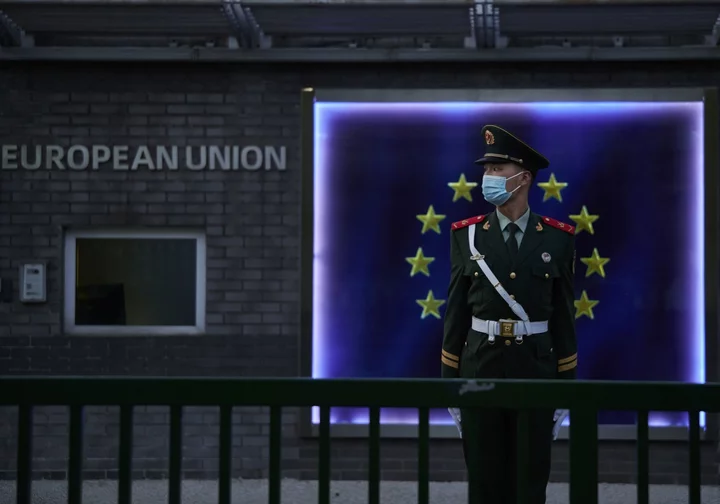The European Union’s top envoys sought to project a united front on relations with China, reaching an initial consensus on a common blueprint for future ties although they still need to work out how to smooth out remaining differences.
Foreign ministers of the EU, meeting in Stockholm, approved the main principles in a road map proposed by the bloc’s foreign affairs arm, according to its head Josep Borrell. Still, he acknowledged member states would seek revisions to the paper ahead of a leaders’ summit in June which will discuss ties with China.
“They agree on the basic lines on this recalibration of our strategy on China, considering the recent domestic evolution in China and the foreign policy trajectory,” Borrell said. “We continue with the triptych because it reflects reality — it’s a rival, competitor and a partner,” he added in a reference to the current approach.
The paper drafted by the EU’s foreign policy arm calls on member states to avoid being drawn into a zero-sum contest between Washington and Beijing as the bloc works to manage China’s rise. It reaffirmed the rival-competitor-partner stance, but said the balance of those approaches will be conditional on how China responds to Europe’s approach.
EU countries have been striving to work out a common stance on tackling China’s economic might, with several stressing that it is increasingly becoming a rival rather than a partner. Some states are pushing for more strategic distance, including new limits on exports of technology to Beijing.
The US and EU will pledge to step up coordination on security measures like export restrictions, the screening of outbound technologies and foreign investment controls to fight back against economic coercion from countries such as China, Bloomberg reported earlier Friday.
‘Different Approaches’
“In a complex relationship like the one we have with China we have unavoidably different approaches because there are different interests,” Borrell said, mentioning “a big exporter to China like Germany” and “countries that have almost no economic relationship.”
EU countries must both “engage which China” on many different issues “and at the same time we have to compete with China and decrease our dependencies when these become too big,” Borrell said.
Borrell cautioned that the future of the EU’s ties to China will also depend on Beijing’s stance toward Russia’s invasion of Ukraine. Beijing will send a special envoy — Ambassador Li Hui — to Ukraine, Russia and other European countries next week in efforts to foster a diplomatic resolution to Russia’s war in Ukraine.
‘Existential Threat’
“For us it’s so important that Russia understands that it is an existential threat for us what’s happening in Ukraine, and we expect that China will use its role and responsibilities,” Borrell said, adding that “if it isn’t the case, our relation won’t be so good.”
European officials, including Commission President Ursula von der Leyen, have increasingly spoken about “de-risking” — but not “de-coupling” — relations with China.
US State Department Counselor Derek Chollet said in an interview in Stockholm earlier Friday that he was confident that “we will see a lot of overlap in terms of our perspective” in relation to the EU’s strategy on China.
“We respect that there’s a multiplicity of views within the EU, even though at a strategic level there is greater convergence on the PRC within the EU, and between the US and the EU, than at any moment that we have had in our history, since 1949,” Chollet said.
--With assistance from Natalia Drozdiak.
Author: Ania Nussbaum, Arne Delfs and Niclas Rolander

